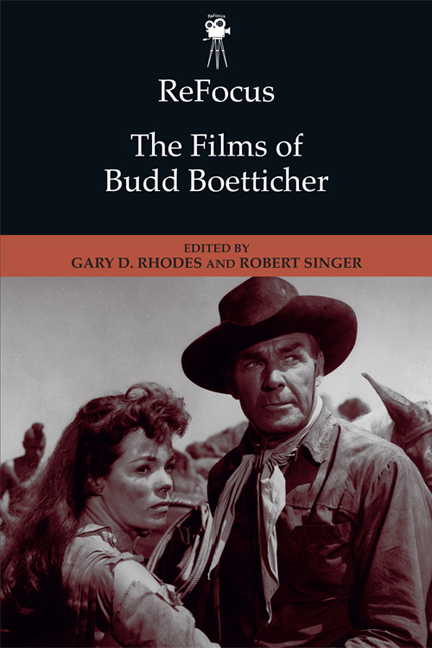Book contents
- Frontmatter
- Contents
- Notes on Contributors
- Dedication
- Introduction
- Part 1 The Non-Westerns
- Part 1 Introduction
- 1 “I never did think he was crazy”: Mystery and Criminality in Boetticher's Psychological Noirs
- 2 On Ethics and Style in Bullfighter and the Lady (1951)
- 3 Domestic Tension and Male Hysteria: The Killer is Loose (1956)
- 4 The Killer is Loose (1956) and the Televisual Dissolution of Film Noir
- 5 Adventures on the Small Screen: Boetticher, Warner Bros., and Maverick
- 6 The Signifying Heel: Boetticher's The Rise and Fall of Legs Diamond (1960)
- Part 2 The Westerns
- Index
3 - Domestic Tension and Male Hysteria: The Killer is Loose (1956)
from Part 1 - The Non-Westerns
Published online by Cambridge University Press: 22 December 2017
- Frontmatter
- Contents
- Notes on Contributors
- Dedication
- Introduction
- Part 1 The Non-Westerns
- Part 1 Introduction
- 1 “I never did think he was crazy”: Mystery and Criminality in Boetticher's Psychological Noirs
- 2 On Ethics and Style in Bullfighter and the Lady (1951)
- 3 Domestic Tension and Male Hysteria: The Killer is Loose (1956)
- 4 The Killer is Loose (1956) and the Televisual Dissolution of Film Noir
- 5 Adventures on the Small Screen: Boetticher, Warner Bros., and Maverick
- 6 The Signifying Heel: Boetticher's The Rise and Fall of Legs Diamond (1960)
- Part 2 The Westerns
- Index
Summary
Filmed a year before the first unofficial entry to the Ranown cycle, Seven Men from Now (1956), The Killer is Loose (1955) has received little, if any, detailed criticism. This has much to do with past critical attention being almost exclusively devoted to the celebrated series of Westerns Boetticher made with Randolph Scott as well as evaluations of his last Hollywood movie The Rise and Fall of Legs Diamond (1960) as a “last hurrah” before a sad decline. Boetticher's contemporary auteur status currently relies upon the recognition of the Ranown cycle as the peak of his career, owing little to what went before or came after. The earlier films of Boetticher's career received little attention and were mostly regarded as impersonal studio assignments before the director's talent would flower in his collaboration with Harry Joe Brown and Randolph Scott. The Cahiers du Cinéma saying of an auteur never making a bad film and a metteur en scène director being incapable of directing a bad film had its blind spots as we all know. Critical attention generally either treated the earlier films in a brief introductory paragraph, before concentrating on the “real business” of analyzing the acknowledged masterpieces, or making excessive, unsubstantiated claims for the importance of some earlier works according to that overenthusiastic sentence of “The cinema is Nicholas Ray” quoted by many who felt no need to show how Ray's films earned that title. The key goal of this “ReFocus” series of books, however, is to look again at the well-known work of past masters as well as providing important perspectives on those who have been previously ignored. In terms of refocus on past masters, it is important to see what associations some early films have to their more accomplished successors. It is in this spirit that I intend to look at a relatively neglected 1955 Budd Boetticher film that is as far removed from the genre the director is usually associated with.
I first saw it about the time of its general release in one of those now sadly absent small cinemas in Swansea, South Wales, as the bottom half of a double feature.
- Type
- Chapter
- Information
- ReFocus: The Films of Budd Boetticher , pp. 40 - 54Publisher: Edinburgh University PressPrint publication year: 2017



